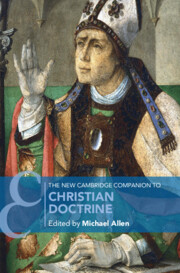Book contents
- The New Cambridge Companion to Christian Doctrine
- Cambridge Companions to Religion
- The New Cambridge Companion to Christian Doctrine
- Copyright page
- Contents
- Contributors
- Preface
- Part I Doctrines
- Part II Movements
- 11 Feminist Theology
- 12 Theological Interpretation of Scripture
- 13 Radical Orthodoxy
- 14 Public Theology
- 15 Disability Theology
- 16 Black Theology
- 17 Pentecostal Theology
- 18 Analytic Theology
- 19 Apocalyptic Theology
- 20 Reformed Catholicity
- 21 Ressourcement Thomism
- Index
- Cambridge Companions to Religion (continued from page iii)
- References
19 - Apocalyptic Theology
from Part II - Movements
Published online by Cambridge University Press: 03 November 2022
- The New Cambridge Companion to Christian Doctrine
- Cambridge Companions to Religion
- The New Cambridge Companion to Christian Doctrine
- Copyright page
- Contents
- Contributors
- Preface
- Part I Doctrines
- Part II Movements
- 11 Feminist Theology
- 12 Theological Interpretation of Scripture
- 13 Radical Orthodoxy
- 14 Public Theology
- 15 Disability Theology
- 16 Black Theology
- 17 Pentecostal Theology
- 18 Analytic Theology
- 19 Apocalyptic Theology
- 20 Reformed Catholicity
- 21 Ressourcement Thomism
- Index
- Cambridge Companions to Religion (continued from page iii)
- References
Summary
No contemporary New Testament exegete can supply a firsthand recollection of what it was like to read Karl Barth’s commentary on Paul’s letter to the Romans, best known by its original German title Der Römerbrief, when it first appeared.1 Its impact was dramatic and game-changing – it is now routinely identified as representing an exciting and unsettling new era of “apocalyptic” theology – but eyewitness reports of that impact are now several generations removed.2 In more recent times, perhaps no New Testament commentary has had an impact more resembling Barth’s than the commentary on Paul’s earlier letter to the Galatians by J. Louis Martyn (1925–2015). First published in 1997 in the Anchor Bible Commentary series, Martyn’s commentary was quickly feted as a watershed in New Testament exegesis as well as in theology more broadly conceived. Pauline scholar John Barclay described Martyn’s Galatians in epochal terms: “Rarely since Luther has the radical, polarising, indeed shocking force of Paul’s letter been so well appreciated by a reader with a visceral antipathy towards the multiple domestications of Paul.”3 And Richard Hays, another celebrated Pauline scholar, made the connection with Barth explicit: “Martyn has written what I take to be the most profound and powerful biblical commentary since Karl Barth’s Römerbrief.”4
- Type
- Chapter
- Information
- The New Cambridge Companion to Christian Doctrine , pp. 315 - 329Publisher: Cambridge University PressPrint publication year: 2022



